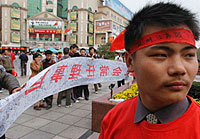




HONG KONG—Sino-Japanese relations have hit a low point after several nagging disputes escalated into three weeks of violent anti-Japanese protests in major Chinese cities.
Talks in Beijing on Monday between Japanese Foreign Minister Nobutaka Machimura and State Councillor Tang Jiaxuan were described by the latter as occurring "under very difficult circumstances."
Former foreign minister Tang—whose status in China's cabinet is that of elder statesman on diplomatic affairs—said the chief sticking points were still Beijing's anger at continuing visits to war shrines by Japanese leaders.
China's patriotism is not the same as anti-Japanese sentiment.
He also cited a school history textbook written by extreme right-wingers, which critics say whitewashes wartime atrocities by Japanese troops, Tokyo's plans to drill for oil in disputed territories, and its bid for a permanent seat on the United Nations Security Council.
However, "China's patriotism is not the same as anti-Japanese sentiment," Tang said, adding that bilateral relations were "at a crossroads."
The meeting follows several waves of anti-Japanese protests during which demonstrators threw paint, bottles, and rocks at diplomatic buildings, and damaged Japan-related business property.
They have also called for a widespread boycott of Japanese goods.
Japan is demanding an apology and compensation for the damage, which includes broken windows at Japanese diplomatic establishments and damaged hoardings advertising Japanese products.
There are two kinds of people getting involved in the anti-Japan movement. One kind are young white-collar workers, and the other are students or recent graduates... These young professionals feel as if they are the elite, and the ought to take notice of affairs of state, but they are also afraid to get involved. Well, this is the only route open to them.
But other East Asian nations joined China in its call for Japan to face up to its wartime history, although they condemned the violence of the Chinese protests.
Indonesian Foreign Ministry spokesman Marty Natalegawa called on both sides "to adopt a conciliatory and forward-looking attitude.''
But he added: "We feel as Indonesians that all countries—including Japan—have to face the facts of history.''
In Vietnam—where the government strictly controls dissent and public protests are extremely rare—small groups of demonstrators rallied outside the Japanese Embassy in Hanoi, protesting Tokyo's bid for a U.N. Security Council seat.
And commentators from South Korea and East Timor added their voices to the call for a conciliatory action from Japan for its wartime history in the region, the Associated Press reported.
Beijing-based independent writer Liu Xiaobo said the protests presented a rare opportunity for government-approved political activism within China.
"There are two kinds of people getting involved in the anti-Japan movement. One kind are young white-collar workers, and the other are students or recent graduates," Liu told RFA's Mandarin service.
"These young professionals feel as if they are the elite, and the ought to take notice of affairs of state, but they are also afraid to get involved. Well, this is the only route open to them," Liu said.
"Issues of Chinese nationalism have become the state-sponsored, approved way for people to become involved in the affairs of the nation."
...The Chinese government would do well to consider a good proposal put forward by Japan, that the two sides form a joint-study taskforce to carry out research into their common history.
Analysts said a lack of top-level bilateral visits in recent years had led to a slow deterioration in Sino-Japanese ties.
While an immediate agreement on all contentious issues was unrealistic, the two sides could begin by promising to do nothing further to worsen relations, Jiang Zuo, professor at Hong Kong's City University, told RFA's Mandarin service.
"And the Chinese government would do well to consider a good proposal put forward by Japan, that the two sides form a joint-study taskforce to carry out research into their common history," Jiang added.
Beijing-based Liu said this proposal put the Chinese government in a difficult position.
"While the textbook in question, which was written in a distorted manner by extreme right-wingers in Japan, will be used only by a small minority of pupils, actually, Chinese textbooks have far more distortions in them."
Most of the people of Japan, China, and South Korea ought to feel strongly that it is good to look toward the future and have friendly ties, and we must hope for the development of relations from now on.
"This makes it very difficult for the Chinese government to agree to this," Liu said.
Thousands of Chinese protesters took to the streets of Shanghai on Saturday, hurling bottles and stones at the Japanese consulate, and shouting slogans, including "Japanese invaders must die."
Tightened security and warnings from police not to take part in unauthorized demonstrations appeared to have averted similar protests in Beijing ahead of Machimura's visit.
Original reporting in Mandarin by Lin Di and RFA's Mandarin service, directed by Jennifer Chou. Produced for the Web in English by Luisetta Mudie.